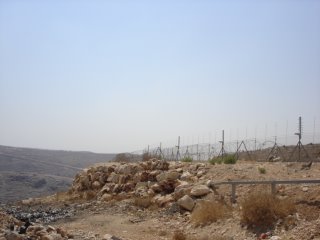
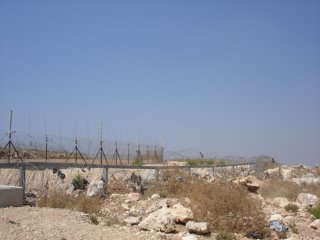
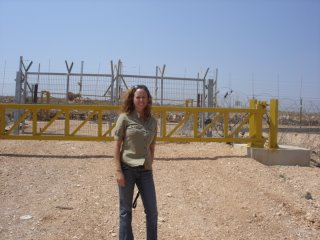
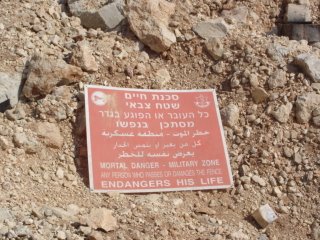
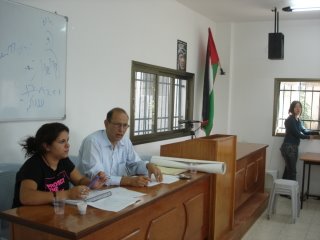
Yesterday was a long, depressing, and exhausting day. The University organized a trip for us to a village called Der Baloot, about 20 km from Tel Aviv that will soon be nearly encircled by the wall and checkpoints. It took us about an hour to get there since Palestinians have to take out of the way roads and go through checkpoints. We first met with the mayor of Der Balloot, who shared with us some problems in his village.
Der Balloot is a village near the green line (that separates Israel from the West Bank), 270 meters above sea level. In 1948, the town lost 15,000 dunums (1 dunum =1000 metres) of the best land. Since the building of the wall, it has lost another 10,000 dunums. Since the economy is based on agriculture, this is having devastating effects on the village.
There are also ancient Roman sites and monuments and churches in the proximity that Palestinians can no longer go to because of settlements that have been built.
In addition, DB villagers had nearly completed the building of a new primary school when Israelis said they had to stop it because it was too close to the proposed wall. The mayor described the lack of a genuine childhood or time of innocence for children who grow up in an environment that is like a prison with checkpoints and soldiers.
The Israeli checkpoint outside Der Ballout was set up in 1989, through which everyone passing must go through extensive searches. Getting through depends on the soldiers’ mood—villagers told us they feel they have no control over their lives. The humiliation, waiting for hours are an everyday experience. Plus, it is difficult for them to get jobs because one never knows how long the wait will be at the checkpoints.
Some other points:
--Israeli settlements in the West Bank (illegal under international law) block Palestinian villages from each other. Palestinians have to use different roads (blocked access) and go through checkpoints that close as early as 4 pm.
--Israelis seize any land they want under the pretense of "security reasons". This means where there is fertile farmland, good views atop hills or natural waterwells, the Israelis have seized to build settlements and deprived Palestinians use of their own land. Then the Israelis build roads to connect these settlements together (roads which the Palestinians can't use) and divide Palestinian areas from each other. In many settlements, Israelis don’t even live there. We passed by one on the way to Der Ballout that is only used on the Jewish sabbath day. When they build a settlement, they build 100 houses even if no one lives there in order to show EU and US that there’s a community there that they can’t move.
--Palestinians living outside checkpoints can't get in to the villages even for emergencies if it’s closed or the line is long. Later in the afternoon, we met a women's NGO that had documented dozens of cases of people dying who needed emergency care and dozens of women who had given birth waiting at checkpoints. The majority of children born in those situations have died.
Another villager shared...“For Palestinians, life is all questions and no answers”. This guy had travelled extensively throughout Europe and the US, and found it difficult to reconcile why Palestinians had such a poor lot. "Where are the ethics? What did they do to deserve this? But we have to just keep going." (Incidentally, a figure I read was that 70% of Palestinians under the poverty line, yet over 90% are literate, one of the highest rates in the ME.)
The wall Israelis are building near the town will be completed by end of year. 20,000 olive trees will be lost and Palestinians will be permanently separated from each other and the outside world, even more drastically than from the effects of the checkpoints. The mayor lamented, "These are not mere difficulties: this is killing."
To these presentations, the students in our program frequently ask, “what can we do? How can we help?"
One villager had an interesting response, “Tell the story. Just tell the truth of what you saw. Counteract the media distortion: that there are for example, no problems here between Christians and Muslims. That we have no problem with Jewish people...our problem is with the people who take our land and oppress us. This is not about religion; this is about the extreme damage politics does to religion...whether al Qa'ida, Zionism, or George Bush. I don't know why God decided to send all the prophets to our land, maybe just to make our life difficult. I've seen the Rocky Mountains; they are so high, so close to God. Why not there???"

No comments:
Post a Comment